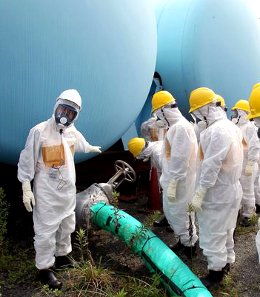Fukushima release tested
 TEPCO is running tests ahead of a plan to release treated Fukushima wastewater in the Pacific.
TEPCO is running tests ahead of a plan to release treated Fukushima wastewater in the Pacific.
Tokyo Electric Power Company Holdings (TEPCO), the operator of the Fukushima nuclear plant, has initiated tests for newly constructed facilities aimed at discharging treated radioactive wastewater into the sea.
The plan has faced significant opposition from local fishing communities and neighbouring countries.
The tests, being conducted at the Fukushima Daiichi nuclear power plant, involve the use of fresh water instead of the treated water.
A newly constructed seaside facility has been examined by plant workers, who assessed pumps and emergency shutdown equipment.
The facility will dilute the treated water with a substantial amount of seawater before releasing it into the ocean through an undersea tunnel located approximately 1 kilometre from the coast. The undersea tunnel and other critical components of the system are nearing completion.
TEPCO plans to continue voluntary tests for about two weeks before mandatory pre-operation checks are carried out by the Nuclear Regulation Authority, likely in early July.
In April 2021, the Japanese government announced its intentions to gradually release the treated water, which is still slightly radioactive but diluted to what it considers safe levels.
The stored water, currently held in around a thousand tanks at the plant, needs to be removed to prevent accidental leaks in the event of an earthquake and to create space for the plant's decommissioning.
Local fishing communities have vehemently protested against the plan due to safety concerns and potential damage to their reputation.
Neighbouring countries such as South Korea, China, and Pacific Island nations have also expressed safety concerns.
To address these concerns, the Japanese government established a fund to promote Fukushima seafood and provide compensation in case sales decline due to safety worries.
Despite meeting with Industry Minister Yasutoshi Nishimura, fishing officials remain opposed to the plan, although they support the progress in decommissioning the plant and express a desire to maintain a dialogue.
Minister Nishimura expressed his hope of gaining the understanding of fishing communities while working to prevent reputational damage.
In South Korea, fishermen staged a rally in Seoul in front of the National Assembly to protest the plan of releasing treated radioactive water.
Japanese officials argue that the diluted water, released gradually over several decades, poses no harm to people or marine life.
Japan has sought the support of the International Atomic Energy Agency to ensure that safety measures meet international standards and to enhance credibility.
While some scientists argue that the impact of long-term, low-dose exposure to radionuclides is uncertain and advocate for a delay in the release, the tanks storing water used to cool the reactor cores since the 2011 earthquake and tsunami disaster will reach their capacity in early 2024.








 Print
Print